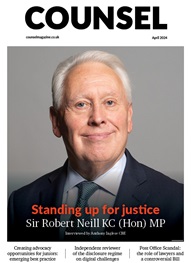*/
Initiatives to broaden diversity in the judiciary are paying off at High Court level.
Official statistics from the Judicial Appointments Commission (“JAC”) show women and black minority ethnic (“BME”) lawyers performed well in the recent High Court selection process between April and September 2010.
Among 13 successful candidates, two were BME and two were women. Some 15 of the 90 applicants were women.
Lord Justice Toulson, Vice Chair of the JAC, said: “Women and BME candidates have done well in all exercises run over this six-month period.
“This is good news and I hope it continues. Further part-time opportunities may help this, as well as enhancing flexibility at a time when reduced government spending makes this important.
“The first ILEX Fellow also became a judge during this time, emphasising that there are various routes by which a person can acquire and show the qualities and abilities for judicial appointment.”
However, Toulson LJ added that a “disappointing” number of solicitors had applied and been recommended.
“Many solicitors do not seek a judicial career,” he said.
“This is often due to personal reasons or because they do not feel supported by their firms. We are working with the Law Society on how to tackle this. We will be publishing a longer term analysis and recommendations in the New Year.”
Among 13 successful candidates, two were BME and two were women. Some 15 of the 90 applicants were women.
Lord Justice Toulson, Vice Chair of the JAC, said: “Women and BME candidates have done well in all exercises run over this six-month period.
“This is good news and I hope it continues. Further part-time opportunities may help this, as well as enhancing flexibility at a time when reduced government spending makes this important.
“The first ILEX Fellow also became a judge during this time, emphasising that there are various routes by which a person can acquire and show the qualities and abilities for judicial appointment.”
However, Toulson LJ added that a “disappointing” number of solicitors had applied and been recommended.
“Many solicitors do not seek a judicial career,” he said.
“This is often due to personal reasons or because they do not feel supported by their firms. We are working with the Law Society on how to tackle this. We will be publishing a longer term analysis and recommendations in the New Year.”
Initiatives to broaden diversity in the judiciary are paying off at High Court level.
Official statistics from the Judicial Appointments Commission (“JAC”) show women and black minority ethnic (“BME”) lawyers performed well in the recent High Court selection process between April and September 2010.


Sam Townend KC explains the Bar Council’s efforts towards ensuring a bright future for the profession
Giovanni D’Avola explores the issue of over-citation of unreported cases and the ‘added value’ elements of a law report
Louise Crush explores the key points and opportunities for tax efficiency
Westgate Wealth Management Ltd is a Partner Practice of FTSE 100 company St. James’s Place – one of the top UK Wealth Management firms. We offer a holistic service of distinct quality, integrity, and excellence with the aim to build a professional and valuable relationship with our clients, helping to provide them with security now, prosperity in the future and the highest standard of service in all of our dealings.
Is now the time to review your financial position, having reached a career milestone? asks Louise Crush
If you were to host a dinner party with 10 guests, and you asked them to explain what financial planning is and how it differs to financial advice, you’d receive 10 different answers. The variety of answers highlights the ongoing need to clarify and promote the value of financial planning.
Most of us like to think we would risk our career in order to meet our ethical obligations, so why have so many lawyers failed to hold the line? asks Flora Page
If your current practice environment is bringing you down, seek a new one. However daunting the change, it will be worth it, says Anon Barrister
Creating advocacy opportunities for juniors is now the expectation but not always easy to put into effect. Tom Mitcheson KC distils developing best practice from the Patents Court initiative already bearing fruit
Sam Townend KC explains the Bar Council’s efforts towards ensuring a bright future for the profession
The long-running fee-paid judicial pensions saga continues. The current cut-off date for giving notice of election to join FPJPS is 31 March 2024, and that date now gives rise to a serious problem, warns HH John Platt